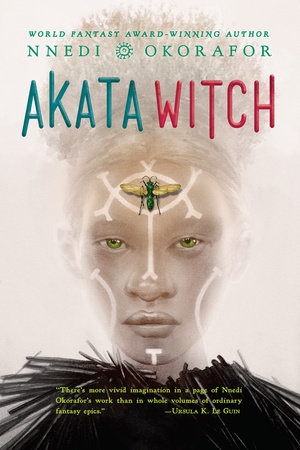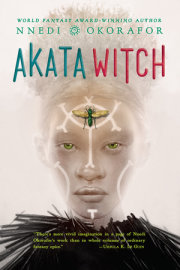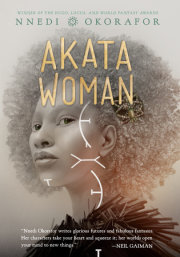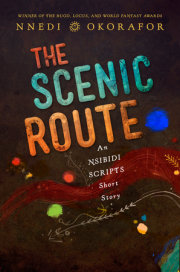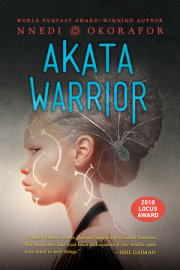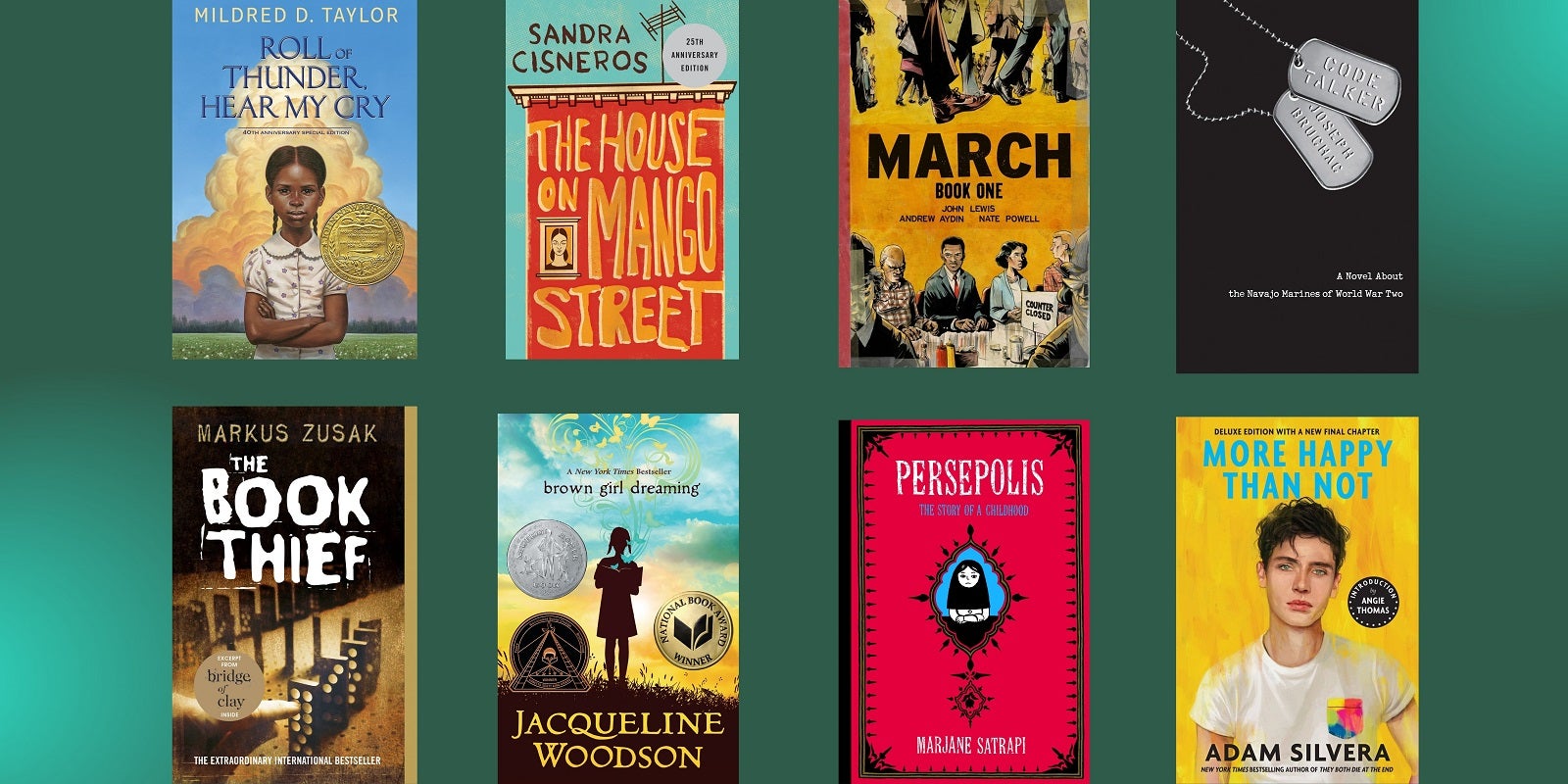***This excerpt is from an advance uncorrected copy proof***
Copyright © 2017 Nnedi Okorafor
Prologue
The Candle
I’ve always been fascinated by candles. Looking into the flame calms me down. Here in Nigeria, PHC is always taking the lights, so I keep candles in my room just in case.
PHC stands for “Power Holding Company of Nigeria,” but people like to say it really stands for “Please Hold Candles in Nigeria.” Back in Chicago we had National Grid, and the electricity was always working. Not here, though. Not yet. Maybe in the future.
One night, after the power went out, I lit a candle as usual. Then, also as usual, I got down on the floor and just gazed at its flame.
My candle was white and thick, like the ones in church.
I lay on my belly and just stared and stared into it. So orange, like the abdomen of a firefly. It was nice and soothing until . . . it started flickering.
Then, I thought I saw something. Something serious and big and scary. I moved closer.
The candle just flickered like any other flame. I moved even closer, until the flame was an inch from my eyes. I could see something. I moved closer still. I was almost there. I was just starting to understand what I saw when the flame kissed something above my head. Then the smell hit me and the room was suddenly bright yellow orange! My hair was on fire!
I screamed and smacked my head as hard as I could. My burning hair singed my hand. Next thing I knew, my mother was there. She tore off her rapa and threw it over my head.
The electricity suddenly came back on. My brothers ran in, then my father. The room smelled awful. My hair was half gone and my hands were tender.
That night, my mother cut my hair. Seventy percent of my lovely long hair, gone. But it was what I saw in that candle that stayed with me most. I’d seen the end of the world in its flame. Raging fires, boiling oceans, toppled sky- scrapers, ruptured land, dead and dying people. It was horrible. And it was coming.
My name is Sunny Nwazue and I confuse people.
I have two older brothers. Like my parents, my brothers were both born here in Nigeria. Then my family moved to America, where I was born in the city of New York. When I was nine, we returned to Nigeria, near the town of Aba. My parents felt it would be a better place to raise my brothers and me, at least that’s what my mom says. We’re Igbo—that’s an ethnic group from Nigeria—so I’m American and Igbo, I guess. You see why I confuse people? I’m Nigerian by blood, American by birth, and Nigerian again because I live here. I have West African features, like my mother, but while the rest of my family is dark brown, I’ve got light yellow hair, skin the color of “sour milk” (or so stupid people like to tell me), and hazel eyes that look like God ran out of the right color. I’m albino.
Being albino made the sun my enemy; my skin burned so easily that I felt nearly flammable. That’s why, though I was really good at soccer, I couldn’t join the boys when they played after school. Although they wouldn’t have let me anyway, me being a girl. Very narrow-minded. I had to play at night, with my brothers, when they felt like it.
Of course, this was all before that afternoon with Chichi and Orlu, when everything changed.
I look back now and see that there were signs of what was to come.
When I was two, during a brief visit to Nigeria with my family, I contracted malaria. It was a bad case and I almost died from it when I got back to the States. I remember. My brothers used to tell me that I was a freak because I could remember so far back.
I was really hot, absolutely burning up with fever. My mother stood over my bed, crying. I don’t remember my father being there much. My brothers would come in once in a while and pat my forehead or kiss my cheeks.
I was like that for days. Then a light came to me, like a tiny yellow flame or sun. It was laughing and warm—but a nice kind of warm, like bathwater that has been sitting for a few minutes. Maybe this is why I like candles so much. It floated just above me for a long time. I think it was watching over me. Sometimes mosquitoes would fly into it and get vaporized.
It must have decided that I wasn’t going to die, because eventually it went away and I got better. So it’s not as if strange things haven’t happened to me before.
I knew I looked like a ghost. All pale-skinned. And I was good at being ghost-quiet. When I was younger, if my father was in the main room drinking his beer and reading his paper, I’d sneak in. I could move like a mosquito when I wanted. Not the American ones that buzz in your ear—the Nigerian ones that are silent like the dead.
I’d creep up on my father, stand right beside him, and wait. It was amazing how he wouldn’t see me. I’d just stand there grinning and waiting. Then he’d glance to the side and see me and nearly jump to the ceiling.
“Stupid, stupid girl!” he’d hiss, because I’d really scared him—and because he wanted to hurt me because he knew that I knew he was scared. Sometimes I hated my father. Sometimes I felt he hated me, too. I couldn’t help that I wasn’t the son he wanted or the pretty daughter he’d have accepted instead. But I couldn’t not see what I saw in that candle. And I couldn’t help what I eventually became.
1
Orlu
The moment Sunny walked into the school yard, people started pointing. Girls started snickering, too, including the girls she usually hung with, her so-called friends. Idiots, Sunny thought. Nevertheless, could she really blame any of them? Her woolly blonde hair, whose length so many had envied, was gone. Now she had a puffy medium-length Afro. She cut her eyes at her friends and sucked her teeth loudly. She felt like punching them each in the mouth.
“What happened?” Chelu asked. She didn’t even have the courtesy to keep the stupid grin off her face.
“I needed a change,” Sunny said, and walked away. Behind her, she still heard them laughing.
“Now she’s really ugly,” she heard Chelu say.
“She should wear some bigger earrings or something,” Buchi added. Sunny’s ex-friends laughed even harder. If you only knew that your days were numbered, she thought. She shivered, pushing away the images of what she’d seen in the candle.
Her day grew even worse when her literature and writing teacher handed back the latest class assignment. The instructions were to write an essay about a relative. Sunny had written about her arrogant oldest brother, Chukwu, who believed he was God’s gift to women, though he wasn’t. Of course, it didn’t help that his name meant “Supreme Being.”
“Sunny’s essay received the highest mark,” Miss Tate announced, ignoring the class’s sneers and scoffs. “Not only was it nicely written, but it was engaging and humorous.”
Sunny bit the inside of her cheek and gave a feeble smile. She hadn’t meant the essay to be funny at all. She’d been serious. Her brother was truly an arrogant nyash. To make things worse, her classmates had all scored terribly. Out of ten points, most received threes and fours.
“It’s a waste of time trying to teach you all proper English,” Miss Tate shouted. She snatched a boy’s essay and read it aloud: “‘My sista always beg though she make good money. She likes to have but not give. She no go change.’” Miss Tate slammed the essay back onto the boy’s desk. “Do you come here just to stare into space? Eh? And you were all so timid in what you wrote. Who wants to hear ‘My mother is very nice’ or ‘My auntie is poor’? And in rotten English, at that! This is why I had you write about a relative. It was supposed to be easy!”
As she spoke, she stomped and clomped about the class- room, her face growing redder and redder. She stepped in front of Sunny’s desk. “Stand, please.”
Sunny looked around at her classmates. Everyone just stared back at her, with slack faces and angry eyes. Slowly, she stood up and straightened her navy-blue uniform skirt.
Miss Tate left her standing as she went to her desk in front of the class. She opened a drawer and brought out her yellow wooden switch. Sunny’s mouth dropped open. Ah-ah, I’m about to be flogged, she thought. What did I do? She wondered if it was because she was twelve, the youngest in the class.
“Come,” Miss Tate said. “But—”
“Now,” she said more firmly.
Sunny slowly walked to the front of the class, aware of her classmates’ eyes boring into her back. She let out a shallow breath as she stood before her teacher.
“Hold out your hand.” Miss Tate, already bloated with anger, had the switch ready. Sunny shut her eyes and braced herself for the stinging pain. But no sting came. Instead, she felt the switch placed in her hand. She quickly opened her eyes.
Miss Tate looked to the class. “Each of you will come up and Sunny will give you three strikes on the left hand.” She smiled wryly. “Maybe she can beat some of her sense into you.”
Sunny’s stomach sank as her classmates lined up before her. They all looked so angry. And not the red kind of anger that burns out quickly—but the black kind, the kind that is carried outside of class.
Orlu was the first in line. He was the closest to her age, just a year older. They’d never spoken much, but he seemed nice. He liked to build things. She’d seen him during lunch hour—his friends would be blabbing away and he’d be to the side making towers and what looked like little people out of Coca-Cola and Fanta caps and candy wrappers. She certainly didn’t want to bruise up his hands.
He stood there just looking at her, waiting. He didn’t seem angry, like everyone else, but he looked nervous. If he had spoken, Miss Tate would have boxed his head.
By this time, Sunny was crying. She felt a flare of hatred for Miss Tate, who up to this day had been her favorite teacher. The woman’s lost her mind, she thought miserably. Maybe I should smack her instead.
Sunny stood there carrying on the way she knew her mother hated her to do. It was pathetic and childish. She knew her pale face was flushed red. She sobbed hard and then threw the switch on the floor. This made Miss Tate even angrier. She pushed Sunny aside. “Sit,” Miss Tate shouted.
Sunny covered her face with her hands, but she cringed with each slap of the switch. And then the person would hiss or squeak or gasp or whatever suited his or her pain. She could hear the desks around her filling up as people were punished and then sat down. Someone behind her kicked her chair and hissed, “You stupid pale-faced akata witch! Your hours are numbered!”
Sunny shut her eyes tight and gulped down a sob. She hated the word “akata.” It meant “bush animal” and was used to refer to black Americans or foreign-born blacks. A very, very rude word. Plus, Sunny knew the girl’s voice.
After school, Sunny tried to escape the school yard. She made it just far enough for no teachers to see her get jumped. Jibaku, the girl who’d threatened her, led the mob. Right there on the far side of the school yard, three girls and four of the boys beat Sunny as they shouted taunts and insults. She wanted to fight back, but she knew better. There were too many of them.
It was a school-yard thrashing and not one of her ex- friends came to her rescue. They just stood and watched.
Even if they wanted to, they were no match for Jibaku, the richest, tallest, toughest, and most popular girl in school.
It was Orlu who finally put an end to it. He’d been yelling for everyone to stop since it started. “Why don’t we let her speak?” Orlu shouted.
Maybe it was because they needed to catch their breath or maybe they truly were curious, but they all paused. Sunny was dirty and bruised, but what could she say? Jibaku spoke up instead—Jibaku, who had slapped Sunny in the face hard enough to make her lip bleed. Sunny glared at her.
“Why did you let Miss Tate beat us?” The sun bore down on Sunny, making her sensitive skin itch. All she wanted to do was get in the shade. “Why didn’t you just do it?” Jibaku shouted. “You’re a scrawny thing, it wouldn’t have hurt much! You could have pretended to be weak as you hit us. Or did you like seeing that white woman beat us like that? Does it make you happy because you’re white, too?”
“I’m not white!” Sunny shouted back, finding her voice again.
“My eyes tell me different,” a plump boy named Periwinkle said. He was called this because he liked the soup with the periwinkle snails in it.
Sunny wiped blood from her lip and said, “Shut up, you snail-sucker! I’m albino!”
“‘Albino’ is a synonym for ‘ugly,’” he retorted.
“Oooh, big words now. Maybe you should have used some of those on your stupid essay! Ignorant idiot!” She added bass to her voice and enunciated the word “idiot” with her most Nigerian accent, making it sound like eeedee-ut. Some of the others laughed. Sunny could always make them laugh, even when she herself felt like crying. “You think I can go around hitting my own classmates?” she said, snatching up her black umbrella. She held it over herself and instantly felt better. “You wouldn’t have done it, either.” She humphed. “Or maybe you would have, Jibaku.”
She watched them grumble to each other. Some of them even turned and started walking home. “What is it you want from me? What would I apologize for?”
There was a long pause. Jibaku sucked her teeth loudly, looking Sunny up and down with disgust. “Stupid oyibo akata witch,” she spat. She motioned to the others. “Let’s go.”
Sunny and Orlu watched them leave. Their eyes met, and Sunny quickly looked away. When she turned back, Orlu was still watching her. She forced herself to keep her eyes on him, to really see him. He had slanted, almost catlike eyes and high cheekbones. He was kind of pretty, even if he didn’t talk much. She bent down to pick up her books.
“Are . . . are you all right?” he asked, as he helped. She frowned.
“I’m fine. No thanks to you.”
“Your face looks all red and, well, punched.”
“Who cares?” she said, putting the last book in her satchel.
“Your mother will,” he said.
“Then why didn’t you stop them?” she screamed. She slung the satchel over her shoulder and walked away. Orlu followed.
“I tried.”
“Whatever.”
“I did. You didn’t see Periwinkle and Calculus do this?” He turned his head so she could see his swollen cheek.
“Oh,” she said, instantly ashamed. “I’m sorry.”
By the time they got to the intersection where their paths home diverged, she felt a little better. It seemed she and Orlu had a lot in common. He agreed Miss Tate’s actions were way out of line, he liked reading books for fun, and he, too, noticed the weaver birds that lived in the tree beside the school.
“I live just a little that way,” Orlu said.
“I know,” she said, looking up the paved road. Like hers, his house was white with a modest fence surrounding it. Her eye settled on the mud hut with the water-damaged walls next door.
“Do you know the lady who lives there?” she asked.
There was smoke coming from the back. Probably from a cooking fire, she thought. She had only once seen the woman who lived in it, some years ago. She’d had smooth brown skin tinted slightly red from the palm oil she rubbed into it. Most of the people in the area believed she was some sort of witch and left her alone.
“That’s Nimm’s house. She lives there with her daughter,” Orlu said.
“Daughter?” she asked. She’d assumed the woman lived alone.
“Hey!” someone yelled from behind them. “Orlu! Who’s the onyocha?”
“Good Lord,” Orlu groaned. “Will the drama never end?”
Sunny whirled around. “Don’t call me that,” she said before she got a good look at the girl. “I hate when people call me that. Do I look like a European? You don’t even know me!”
“Seen you around,” the girl said. She was fine-boned, dark brown, and elfin, but her voice was loud and strong and arrogant. So was her smile. She wore an old-looking red, yellow, and blue dress and no shoes. She swaggered over to Sunny and they stood there, sizing each other up. “Who are you?” Sunny finally asked.
“Who are you?” the girl retorted. “Did someone run you over?”
Orlu sighed loudly, rolling his eyes. “Sunny, this is Chichi, my neighbor. Chichi, this is Sunny, my classmate.”
“How come I’ve never seen you at school?” Sunny asked, still irritated. She dusted off her hopelessly dirty clothes. “You look around our age, even if you are kind of . . . small.”
“I’ve never needed your stupid school.” Before Chichicould say any more, she and Orlu exchanged a look. “And I’ll never tell you my age. I could be older or younger than you. You’ll never know, even if you are half ghost and half human.” She smirked, looking Sunny up and down, obviously itching for a fight. “Even when you speak Igbo you don’t quite sound Igbo.”
“That’s my accent. I’m American,” Sunny said through gritted teeth. “I spent most of my life there. I can’t help the way I speak.”
Chichi put her hand up in mock defense. “Oh, did I hit a sore spot? I am so sorry.” She laughed.
Sunny could have slapped her. At this point, another fight wouldn’t have made much difference.
“Well,” Orlu quickly said, stepping between them, “this isn’t going very well.”
“You live there?” Sunny asked, leaning around Orlu and motioning toward the hut.
“Yeah,” Chichi asked. “My mother and I don’t need much.”
“Why?” she asked.
Orlu stepped back, looking perplexed.
“I’ll never tell you,” Chichi said with a sly grin. “There’s more to the world than big houses.” She chuckled, turning away. “Have a nice evening, Orlu. See you around, Sunny.”
“Yeah, if I don’t step on you first,” Sunny said.
“Yeah, and if I can even see you coming, ghost girl,” Chichi shot back over her shoulder.
Orlu only shook his head.
. All rights reserved. No part of this excerpt may be reproduced or reprinted without permission in writing from the publisher.

